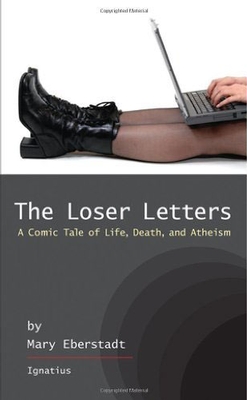
The Loser Letters: A Comic Tale of Life, Death and Atheism by Mary Eberstadt (Ignatius)
One thing that atheists should believe is that nothing, least of all themselves, is sacred. It would be delightful, therefore, to be able to report that Mary Eberstadt’s The Loser Letters is almost impossible to review due to the difficulty of typing while wiping tears from one’s eyes, slapping one’s thighs and holding together one’s rapidly splitting sides. Unfortunately, there are fewer laughs in The Loser Letters than may be located in the Book of Revelations.
Eberstadt is a conservative Catholic grandee, a former speechwriter for George Schultz and an assistant to Jeanne Kirkpatrick. Her book takes the form of a series of dispatches from a former believer who has read their way through currently popular atheist literature – Richard Dawkins’s The God Delusion, Christopher Hitchens’s God Is Not Great, Sam Harris’s The End Of Faith, et al. – and has been, for want of a more appropriate term, converted to unbelief. The book consists of ironic letters to the standard-bearers of atheism offering suggestions as to how they can win over more people.
This is potentially a promising set-up. Militant atheism is as ripe for satire as any collection of opinions, and personalities as imposing as Dawkins and Hitchens in particular offer rich possibilities for caricature. Unfortunately, Eberstadt fumbles it from the start.
The big joke underpinning her mercifully brief tract is that no such person as her narrator – i.e., someone who has renounced God after reading around the subject – exists: “Apart from me,” asks the first of these epistles in faux-naif tones, “where is the testimony of anyone Your writings have actually convinced?” (The capitalised “Your”, a recurring trope, seems to indicate that Eberstadt thinks that Dawkins/Hitchens/ Harris wish themselves to be regarded as gods – an altogether baffling assertion).
Well. Your reviewer does not claim his experience as definitive, but he has certainly met people who’ve told him that their doubts about the faith they’d been raised in were usefully crystallised by Dawkins, Hitchens or Harris (or others); your reviewer would note further that everybody he knows or indeed has heard of has had their mind changed about something by reading; and your reviewer would then admit that Eberstadt’s point eludes him utterly. Which wouldn’t be a problem if she was funny or acute, but she’s neither, merely leadenly sarcastic in the swiftly wearisome meter of a middle-aged writer attempting to approximate hipster-speak.
Eberstadt can revel in one small victory, however: her tedious little book will at least reconnect the sceptic with the divine at the moment he turns the final page and whispers, with feeling, “Thank Christ for that.”

